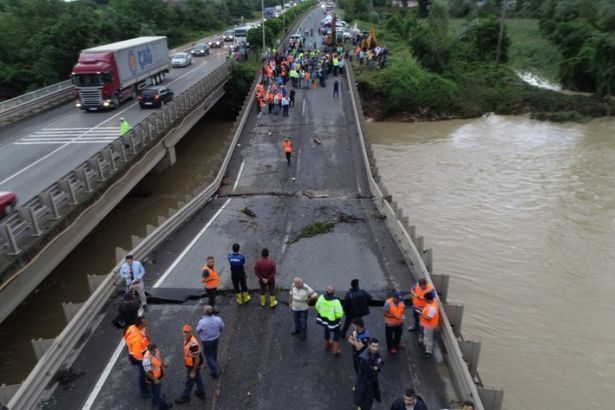Statement of Turkey's engineers on flash flood disaster

The Union of Chambers of Turkish Engineers and Architects (TMMOB) made a statement regarding the flash floods that hit Turkey's province of Ordu. Four bridges collapsed and hundreds of people remained struck at homes and cars due to the flood on August 8.
The engineers indicate to profit-oriented urbanization policies as the real reason for the disaster. Stating that people witness similar problems in the same seasons of the year in the East Black Sea Region, the TMMOB administration says that the destruction of residents around the coastal road does not stem from natural conditions but pro-market urban projects in the region.
The engineers indicate to three common issues regarding the flash floods in the region: The constructions on the stream bed, the coastal road around the Black Sea preventing the streams from reaching the sea, and the disruption of the flow regime due to hydroelectric power plants. They underline that the safety of life and property of the people in the region could not be ensured without reaching a solution for these three issues.
The construction of hydroelectric power plants increased since the AKP government came to power with an excuse to meet energy resources insufficiency. To facilitate the realisation of these hydroelectric power plant projects, environmental impact analysis reports were tampered with and pro-government companies made huge profits. As these hydro-electric power plants cause massive deforestation and change the natural flow direction of streams, the frequency of some disasters like flash-floods have increased.
"The government makes these problems permanent, let alone solve them, leading to a bigger threat around the region," the TMMOB says, adding that the authorities approve shanty urbanization on the stream beds. The engineers underline that hydroelectric power plants and mining activities destroy the flora, indicating that a planned urbanization and transportation or energy policies is necessary for protecting the nature and people.
BACKGROUND OF THE COASTAL ROAD PROJECT
The Black Sea Coastal Road is a 1453-kilometre route starting from Sakarya province in the west to Kars in the east, a project that was carried out with the method of land reclamation from the sea.
The project had been launched in 1987 under then-Prime Minister Turgut Özal, the politician who had accelerated neoliberal policies in Turkey, as it was inaugurated in 2007 by the President Recep Tayyip Erdoğan. The project, which was implemented despite popular protests and lawsuits, had led to several natural disasters.
As the coastal road was constructed as an apparent example of rent-seeking urbanization and transportation policies with the cooperation of right-wing governments and capitalists, some other disasters were witnessed prior to the recent one.
Accumulated water following heavy rainfall in 2009 caused severe material damage in Giresun province. Flash floods led to damage in many towns in the past, as two people were killed due to a flood in 2016.
Following the rule of Erdoğan's Justice and Development Party, the coastal road project became one of the major projects of the government. Erdoğan invited a former minister from Özal's party to the inauguration ceremony of the project in April 2007. The former minister is known to have faced trial at a supreme court for his role in tender corruption for the coastal road project.
"It was a misguided project, yet we had to do it because more than 7 hundred trillion had already been spent for it," said Binali Yıldırım, the chairperson of the parliament from the ruling AKP party.
During the construction of the Black Sea coastal road project, the chamber of environmental engineers raised their criticism of the AKP government as an expert opinion. The chamber asked whether this road project was really necessary; whether another method apart from land reclamation could have been used; whether they analysed how the streams would reach to the sea and whether the safety of the roads would be met in a region with heavy rainfall.
The AKP government had evaded such expert opinions and the then-prime minister Recep Tayyip Erdoğan noted in 2010 that these criticisms are from "some environmentalist groups rejecting hydro-electric power plants and all kinds of energy investments. They mislead my citizens with false information."



